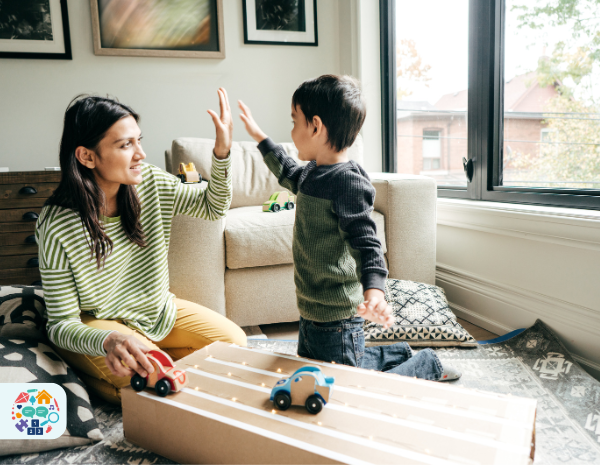Key figures from the NLT research states "4 in 5 (78.1%) of parents said they had chatted to their child at least once a day in the last week, a decrease of 12.2 percentage points(pp) compared with 2019, when 9 in 10 (90.3%) said they had done this".
Further, "1 in 2 (56.0%) parents (…) had played together with their child at least once a day in the last week. This compares with 3 in 4 (76.2%) who reported playing with their child daily in 2019". And, "1 in 2 (50.5%) parents said they had read with their child daily in 2024" compared to 66.1% in 2019.
Early Years Wales is concerned about the decline outlined in this research with regards to reading, but also in other interactive opportunities such as playing and chatting. These interactions between the child and the caregiver are vital in a child's development, improving learning and understanding of language, and the nuances of facial expressions. The rate of development in the early years means that this communication is powerful and long lasting.
We understand that the pressure and demands of work, as well as interruption from digital devices such as smartphones and tablets is having an impact on child and caregiver interaction. However, at Early Years Wales, we wish to help parents understand the value of these interactions with their child.
Our own Active training centres the use of stories, songs, and rhymes to encourage movement achieved by the support of working with BookTrust Cymru, and our Step Into Welsh Through Play, Movement and Stories in partnership with St Fagans National Museum of History aim to help families who are learning Welsh engage in playful learning as adult and child together.
"Any time spent talking, playing, reading and singing is extremely important. You are not just helping with language, but building the foundations for their future learning; and there's nothing better than enjoying a story, or chatting with a child. If you've ever done this, you know their unique perspectives and conversations can be a highlight of an adult's busy day."
-- CEO of Early Years Wales, David Goodger
Literacy Trust
Booktrust Cymru

